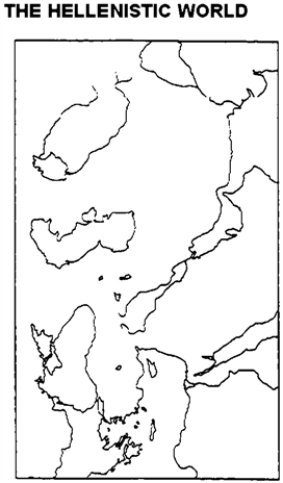Exam 3: The Greeks: From Myth to Reason
Exam 1: The Ancient Near East: the First Civilizations82 Questions
Exam 2: The Hebrews: a New View of God and the Individual76 Questions
Exam 3: The Greeks: From Myth to Reason95 Questions
Exam 4: Rome: From City-State to World Empire92 Questions
Exam 5: Early Christianity: a World Religion79 Questions
Exam 6: The Rise of Europe: Fusion of Classical,christian,and Germanic Traditions89 Questions
Exam 7: The Flowering and Dissolution of Medieval Civilization84 Questions
Exam 8: Transition to the Modern Age: Renaissance and Reformation91 Questions
Exam 9: Political and Economic Transformation: National States, overseas Expansion, commercial Revolution84 Questions
Exam 10: Intellectual Transformation: the Scientific Revolution and the Age of Enlightenment85 Questions
Exam 11: The Era of the French Revolution: Affirmation of Liberty and Equality92 Questions
Exam 12: The Industrial Revolution: the Transformation of Society78 Questions
Exam 13: Thought and Culture in the Early Nineteenth Century82 Questions
Exam 14: Surge of Liberalism and Nationalism: Revolution, counterrevolution, and Unification76 Questions
Exam 15: Thought and Culture in the Mid-Nineteenth Century: Realism, positivism, darwinism, and Social Criticism86 Questions
Exam 16: Europe in the Late Nineteenth Century: Modernization, nationalism, imperialism93 Questions
Exam 17: Modern Consciousness: New Views of Nature, human Nature, and the Arts77 Questions
Exam 18: World War I: the West in Despair83 Questions
Exam 19: An Era of Totalitarianism88 Questions
Exam 20: World War II: Western Civilization in the Balance56 Questions
Exam 21: Europe After World War II: Recovery and Realignment, 1945-198959 Questions
Exam 22: The Troubled Present55 Questions
Select questions type
The Athenian city-state experienced all of the following government styles except
(Multiple Choice)
4.8/5  (26)
(26)
Please use this outline map of the Hellenistic world to answer the question(s).
 -On the map of the Hellenistic World,transform Alexander's Empire into modern day states,areas,and nations.Please shade and identify.
-On the map of the Hellenistic World,transform Alexander's Empire into modern day states,areas,and nations.Please shade and identify.
(Essay)
4.8/5  (31)
(31)
Please define the following key terms. Show Who? What? Where? When? Why Important?
-Xerxes
(Essay)
4.7/5  (31)
(31)
Please define the following key terms. Show Who? What? Where? When? Why Important?
-Socrates
(Essay)
4.9/5  (43)
(43)
Please use this outline map of the Hellenistic world to answer the question(s).
 -Analyze theChapter Three text book sculptures of The Wrestler,Zeus,Alexander on Horseback and the Old Market Woman.Explain the changes in Greek history and culture that produced these particular styles and their changes.
-Analyze theChapter Three text book sculptures of The Wrestler,Zeus,Alexander on Horseback and the Old Market Woman.Explain the changes in Greek history and culture that produced these particular styles and their changes.
(Essay)
4.8/5  (36)
(36)
Please define the following key terms. Show Who? What? Where? When? Why Important?
-Sophocles
(Essay)
4.8/5  (34)
(34)
Please use this outline map of the Hellenistic world to answer the question(s).
 -The death of Socrates has often been depicted in works of art.Evaluate why his life and death are significant.
-The death of Socrates has often been depicted in works of art.Evaluate why his life and death are significant.
(Essay)
4.7/5  (35)
(35)
The Athenian leader that helped to introduce democracy to Athens after Pisistratus' death was
(Multiple Choice)
4.9/5  (38)
(38)
Please define the following key terms. Show Who? What? Where? When? Why Important?
-Plato
(Essay)
4.9/5  (37)
(37)
Please use this outline map of the Hellenistic world to answer the question(s).
 -It has been said by some that great men make history.To what extent would you apply this principle to Greece?
-It has been said by some that great men make history.To what extent would you apply this principle to Greece?
(Essay)
4.8/5  (27)
(27)
The Pythagoreans sought a mathematical order they believed to be inherent in the universe.They also
(Multiple Choice)
4.8/5  (41)
(41)
Please define the following key terms. Show Who? What? Where? When? Why Important?
-The Parthenon
(Essay)
4.8/5  (30)
(30)
Please define the following key terms. Show Who? What? Where? When? Why Important?
-The Republic
(Essay)
4.7/5  (33)
(33)
Please define the following key terms. Show Who? What? Where? When? Why Important?
-Euripides
(Essay)
4.7/5  (26)
(26)
Showing 41 - 60 of 95
Filters
- Essay(0)
- Multiple Choice(0)
- Short Answer(0)
- True False(0)
- Matching(0)